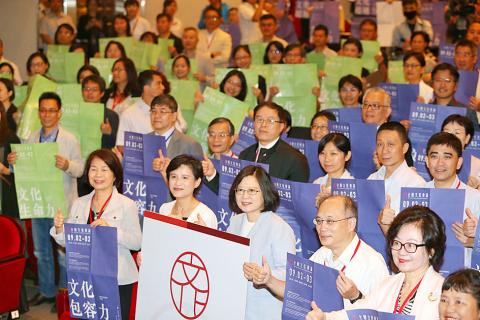President Tsai Ing-wen (蔡英文) yesterday said she is looking forward to more democratic and diverse dialogue at the National Cultural Congress, promising that the advice received from the public at the congress would be incorporated into her administration’s cultural policy white paper.
Speaking at the opening ceremony, Tsai called on academics and the public to engage in discussions and present ideas that can elevate cultural policies.
“We live in changing times and cultural policy needs new ideas and experimentation,” she said. “We have to upgrade our cultural policy as the nation transitions.”

Photo: CNA
A wave of digitalization and the increased footprint of foreign immigrants and workers have enriched Taiwan’s culture since similar congresses in 1990, 1997 and 2002, she said.
“We are all cultural citizens, each with the right to find the core values of Taiwan’s culture,” Tsai said.
“Taiwan is not large, but our cultural soft power does not lag behind that of the world’s major countries,” she said, adding that culture is the nation’s soul and bestows power when it has vitality.
Tsai, who attended the previous National Cultural Congress as then-head of the Mainland Affairs Council, said that the nation’s soft cultural power — including the opening ceremony of the Taipei Summer Universiade last month and HBO Asia’s TV series The Teenage Psychic (通靈少女) — “do not pale in comparison to that of other countries.”
“These examples show that we are becoming more international and if we can establish a more complete system, the younger generation will be able to find its roots here and in the process dig up an endless amount of subject material,” she said.
This congress is an important milestone and the advice of different sectors of society would be incorporated into a national white paper on cultural policy after a clear consensus is reached, Tsai said.
“We are inviting everyone to cultivate Taiwan’s culture together and this task is not going to end just because we have held a meeting today,” she said.
The congress is the culmination of cultural meetings across the nation from March to June that have helped the public to express their thoughts on the administration’s cultural policies.
Minister of Culture Cheng Li-chiun (鄭麗君) said her discussions with groups and workers left her with a strong sense that many feel “the government’s support system is never adequate.”
The government’s cultural policy needs to integrate with everyday life, Cheng said.
Preparations for the congress had been under way for more than a year and it followed a “marathon” half-year of regional meetings, she said.

CHAOS: Iranians took to the streets playing celebratory music after reports of Khamenei’s death on Saturday, while mourners also gathered in Tehran yesterday Iranian Supreme Leader Ayatollah Ali Khamenei was killed in a major attack on Iran launched by Israel and the US, throwing the future of the Islamic republic into doubt and raising the risk of regional instability. Iranian state television and the state-run IRNA news agency announced the 86-year-old’s death early yesterday. US President Donald Trump said it gave Iranians their “greatest chance” to “take back” their country. The announcements came after a joint US and Israeli aerial bombardment that targeted Iranian military and governmental sites. Trump said the “heavy and pinpoint bombing” would continue through the week or as long

TRUST: The KMT said it respected the US’ timing and considerations, and hoped it would continue to honor its commitments to helping Taiwan bolster its defenses and deterrence US President Donald Trump is delaying a multibillion-dollar arms sale to Taiwan to ensure his visit to Beijing is successful, a New York Times report said. The weapons sales package has stalled in the US Department of State, the report said, citing US officials it did not identify. The White House has told agencies not to push forward ahead of Trump’s meeting with Chinese President Xi Jinping (習近平), it said. The two last month held a phone call to discuss trade and geopolitical flashpoints ahead of the summit. Xi raised the Taiwan issue and urged the US to handle arms sales to

State-run CPC Corp, Taiwan (CPC, 台灣中油) yesterday said that it had confirmed on Saturday night with its liquefied natural gas (LNG) and crude oil suppliers that shipments are proceeding as scheduled and that domestic supplies remain unaffected. The CPC yesterday announced the gasoline and diesel prices will rise by NT$0.2 and NT$0.4 per liter, respectively, starting Monday, citing Middle East tensions and blizzards in the eastern United States. CPC also iterated it has been reducing the proportion of crude oil imports from the Middle East and diversifying its supply sources in the past few years in response to geopolitical risks, expanding

Pro-democracy media tycoon Jimmy Lai’s (黎智英) fraud conviction and prison sentence were yesterday overturned by a Hong Kong court, in a surprise legal decision that comes soon after Lai was jailed for 20 years on a separate national security charge. Judges Jeremy Poon (潘兆初), Anthea Pang (彭寶琴) and Derek Pang (彭偉昌) said in the judgement that they allowed the appeal from Lai, and another defendant in the case, to proceed, as a lower court judge had “erred.” “The Court of Appeal gave them leave to appeal against their conviction, allowed their appeals, quashed the convictions and set aside the sentences,” the judges